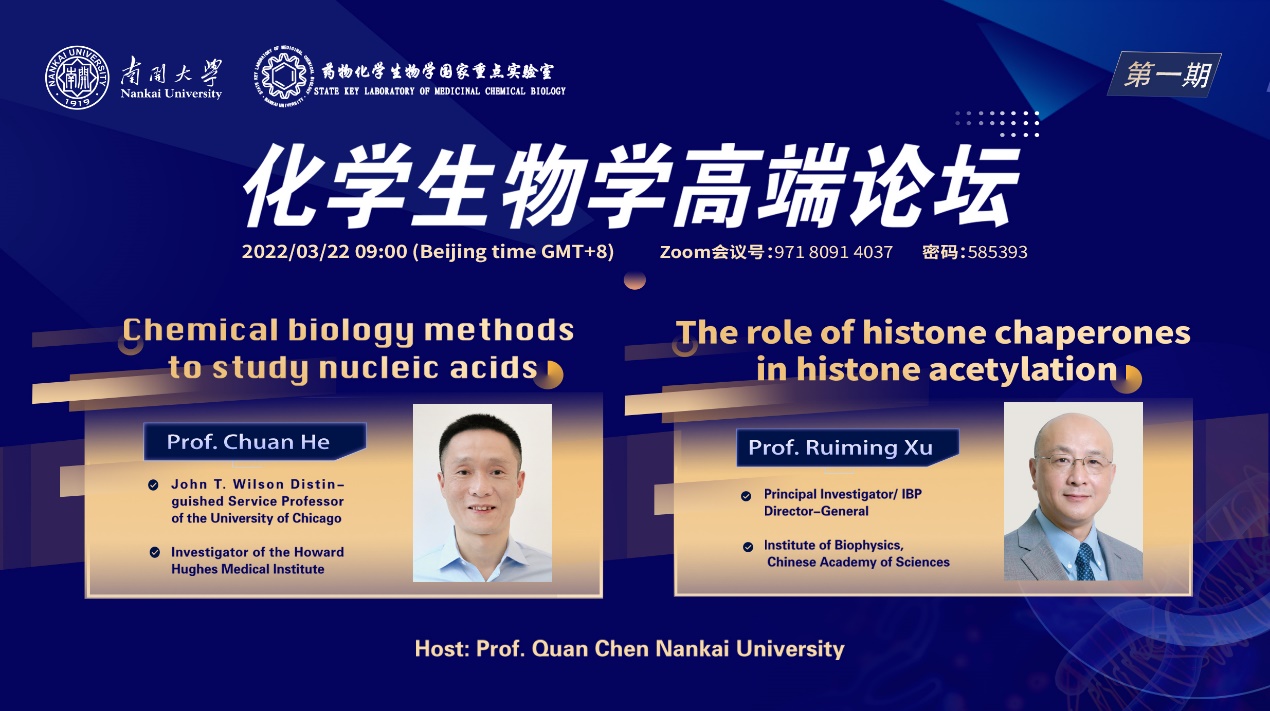The High-End Forum of Chemical Biology (hereinafter referred to as the Forum) was held by the State Key Laboratory of Medicinal Chemical Biology on March 22th, 2022. The forum is one of a series of academic activities organized by the State Key Laboratory of Medicinal Chemical Biology, with Phase I held online. Professor He Chuan from the University of Chicago and Professor Xu Ruiming from the Institute of Biophysics, Chinese Academy of Sciences were invited to deliver academic reports to teachers and students online. Professor Chen Quan, director of the State Key Laboratory of Medicinal Chemical Biology, hosted the forum. The forum attracted around 300 teachers and students from inside and outside the campus.

After opening the forum, Professor Chen Quan extended a warm welcome to the experts, counterparts and students. He said that the forum was one of the State Key Laboratory of Medicinal Chemical Biology’s important academic activities. Internationally acclaimed scientists will continue to be invited for academic exchange with the faculty and students, so as to create a good academic atmosphere and to establish an international exchange platform. Afterwards, Professor Chen Quan introduced the research background and main achievements of the two speakers.
He Chuan is the John T. Wilson Chair Professor in the University of Chicago, as well as a Professor of Department of Chemistry and Department of Biochemistry and Molecular Biology. He received his Bachelor degree from the University of Science and Technology of China in 1994 and his doctoral degree from the Massachusetts Institute of Technology in 2000. From 2000 to 2002, he engaged in postdoctoral research in Harvard University. From 2002, he began to teach in the University of Chicago, and became an Associate Professor in 2008 and a full Professor in 2010. Since 2013, he has been a researcher in the Howard Hughes Medical Institute (HHMI). Recent research by Professor Hu Chuan has focused on reversible RNA and DNA methylation in biological regulation. His research group discovered the RNA demethylase and reversible RNA methylation process for the first time. His research has suggested that dynamic RNA modification is of great significance for subsequent gene expression.

The title of Professor He Chuan’s report was “Chemical biology methods to study nucleic acids”. First, based on an important technical issue in the research field of chemical modification of nucleic acid—nucleic acid intracellular labeling, he introduced important scientific issues and major research progress in this field. Subsequently, he introduced the chemical biology method based on N3-kethoxal chemical modification and the use of N3-kethoxal chemical modification to expand RNA secondary structure analysis, dynamic observation of RNA transcription, and analysis of RNA-RNA interactions. Finally, he introduced the latest modified RNA sequencing technology developed by his research group and its application in the field of noncoding RNA. He expected that his published research results would make new contributions to the progress of the field of nucleic acid chemistry.
Xu Ruiming is a recipient of the “National Science Fund for Distinguished Young Scholars” and a fellow of the American Association for the Advancement of Science. He is currently the Director and a research group leader in the Institute of Biophysics, Chinese Academy of Sciences and President of Campus of Life Sciences, University of Science and Technology of China. He graduated from the Department of Physics, Zhejiang University in 1984. From 1984 to 1989, he enrolled in the Department of Physics, Brandeis University and received both a Master's degree and a doctoral degree in Physics. He then engaged in postdoctoral research in the Department of Physics, University of Texas at Austin and the State University of New York at Stony Brook. He reached the position of Professor in the US before returning to China. Professor Xu Ruiming mainly focuses his research on the structural biology of gene expression and regulation, namely epigenetic regulation of gene transcription and RNA processing after transcription.

The title of Professor Xu Ruiming’s report was “The role of histone chaperones in histone acetylation”. Professor Xu Ruiming first introduced the background to the research field of epigenetic regulation of gene expression, and then launched into the main body of his talk—the study of molecular chaperone family members and regulatory pathways related to chromosomal histone modification. Starting from histone constituting nucleosome assembly to the introduction of histone chaperone network, Professor Xu Ruiming introduced important basic concepts in epigenetics, such as interaction networks, modification and assembly of histone chaperones. Next, based on the profound accumulation of years of research progress on complex structures between histones and molecular chaperones, he introduced the novel 3D structure of histone acetylase and Hat1-Hat2-Asf1-H3-H4 protein complexes and predicted a possible model for histone transport between molecular chaperones, thus providing an important structural basis for the molecular mechanism of histone chaperone regulating nucleosome.

After the report, Professor Chen Quan hosted a Q&A session. The participating faculty and students actively communicated and interacted with the two experts, who also answered their questions in details in a lively atmosphere. At the end, Professor Chen Quan expressed his gratitude to the two experts for their talks, and to the faculty and students for attending the forum. He hoped that everyone would continue to support the high-end series of activities in chemical biology to facilitate an academic atmosphere, develop the ideas in scientific research, and strengthen exchange and cooperation.